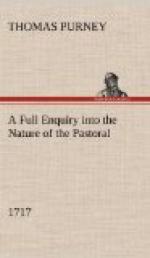If you allow that the fault should be the natural or probable Consequence of the Temper; let me ask you then, if those Tragedies or Pastorals can be so perfect, where the original natural Temper of the Hero or Heroine is not drawn into the Piece. I mean, where all that we see of the Mind of the Chief Character, is his Mind or Temper, as alter’d entirely, by some foreign or accidental Means. As, Who will tell me what Hamlet’s natural Temper was? Throughout that admirable Tragedy, we see not his bare Temper once; but before he appear’s, he’s in wild Distraction, which proceed’s from former Accidents. This Method Mr. Row too has taken, especially in that ingenious Tragedy, call’d JANE SHORE. We do not see any thing of her Temper but Grief and Sorrow; but Grief cannot be natural to any Person’s Mind, but must be accidental. However, I think, this Method may be, at least, very good; whether ’tis the best, I leave others to determine.
But as to the Fault, whether ’tis in the Action, or out of it, is of no moment to the Perfectness of a Pastoral. Tho’ I must needs say, I am for what Aristotle call’s the Peripatie, or change of Fortune in Pastoral; but I think the Action that produces the Change may be either in the Poem, or have happen’d some time before, but so that it’s Influence does not reach the Persons till they have been a while engaged in the Actions of the Tragedy or Pastoral.
SECT. Last.
Here Sophy closed his Book; for the Heat of the Day came on, and an House or an Arbour began to be more agreeable than the open Fields. Sophy told the Swain he would meet him there agen in the Evening, and read him some more of the Minutes he had put down for his Direction, and withdrew; and the Shepherd drove his Lambs to the Covert of the Shades.
Accordingly, as the day began to decline, the Critick again appear’d; and opening his Book, pursued the Argument he had made some Progress in.
The End of the first Part.
PART II.
CHAP. I.
Of the Pastoral CHARACTERS or MANNERS, in general.
I should but tire the Reader, if I endeavour’d to prove that Pastoral does require the Manners, or Characters to be preserved. If our Method of ordering Pastoral be admitted, the Necessity thereof will be easily perceived. But If any one prefer’s the ordinary Method, I must tell him, that ’tis not proper to draw Characters in a Piece of an hundred Lines.
It is to be observ’d, that tho’ a Fable and Moral are essential to every Poem; yet a Poem may subsist without the Manners. In Epick Poetry the Machinery, the sublime Descriptions, &c. are such strong and Poetical Ornaments, that a very fine Piece of the Heroick kind, might be form’d without the Ornament of Characters. But Pastoral is in it self, (if I may so speak) less Poetical; and therefore more want’s the additional Ornaments of Art.




